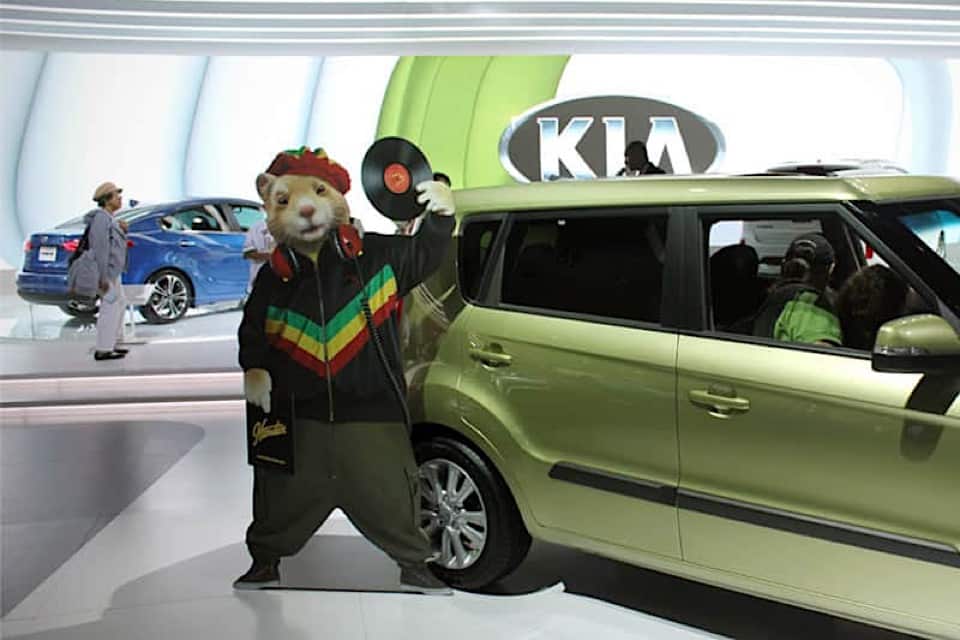Hyundai's Soy Wiring Is a Little Too Eco-Friendly
- Hyundai uses a soy-based electrical wire coating that is cheaper and more environmentally friendly.
- It also tends to attract rodents that love the material for nest building.
- A soy-based wire insulation lawsuit was filed against Hyundai in 2017.

OK, now this advertising campaign makes more sense
The problem is it also grabbed the attention of rodents, who use the chew the material and often use the scraps for nests.
The Soy-Based Lawsuit ∞
Hyundai was sued for using soy-based wire insulation by a group representing 2013-2016 Hyundai Veloster, Accent, Azera, Elantra, Equus, Genesis Coupe, Santa Fe, Sonata and Tuscon owners purchased or leased in California.
The case, Michelle Martinez v. Hyundai Motor America, Inc., argues that when an owner takes their vehicle in for repairs due to the chewed wires, the gnawed materials are replaced with more soy-based materials. A vicious ciricle ensues, and owners can spend thousands of dollars just keeping their cars running.
The plaintiff says rodents chew on numerous parts of Hyundai vehicles, including the hood insulation, battery wiring assembly and harness, filter assembly for the engine, wiring assembly and battery shims.
An Industry Wide Problem ∞
Honda, Toyota, Kia, and Subaru are all facing similar lawsuits.
Generations Where This Problem Has Been Reported
This problem has popped up in the following Hyundai generations.
Most years within a generation share the same parts and manufacturing process. You can also expect them to share the same problems. So while it may not be a problem in every year yet, it's worth looking out for.
4th Generation Accent
- Years
- 2011–2017
- Reliability
- 34th out of 50
- PainRank™
- 5.78
- Complaints
- 119
5th Generation Azera
- Years
- 2012–2016
- Reliability
- 19th out of 50
- PainRank™
- 2.01
- Complaints
- 27
5th Generation Elantra
- Years
- 2011–2016
- Reliability
- 49th out of 50
- PainRank™
- 45.43
- Complaints
- 937
2nd Generation Genesis Coupe
- Years
- 2013–2016
- Reliability
- 11th out of 50
- PainRank™
- 0.86
- Complaints
- 12
3rd Generation Santa Fe
- Years
- 2013–2018
- Reliability
- 46th out of 50
- PainRank™
- 19.69
- Complaints
- 270
6th Generation Sonata
- Years
- 2011–2014
- Reliability
- 50th out of 50
- PainRank™
- 68.11
- Complaints
- 1312
7th Generation Sonata
- Years
- 2015–2019
- Reliability
- 45th out of 50
- PainRank™
- 18.44
- Complaints
- 277
2nd Generation Tucson
- Years
- 2010–2015
- Reliability
- 41st out of 50
- PainRank™
- 14.64
- Complaints
- 198
3rd Generation Tucson
- Years
- 2016–2020
- Reliability
- 42nd out of 50
- PainRank™
- 15.27
- Complaints
- 345
Further Reading
A timeline of stories related to this problem. We try to boil these stories down to the most important bits so you can quickly see where things stand. Interested in getting these stories in an email? Signup for free email alerts for your vehicle over at CarComplaints.com.
Hyundai is being sued for using soy-based wire insulation that attracts rabbits, mice, squirrels and other creatures.
The Hyundai lawsuit alleges the automaker denies there is a problem by using the soy-based wiring and since no defect exists, any replacement parts will also consist of soy products.
The soy-based materials are more biodegradable and generally cost less than their plastic counterparts.…
keep reading article "Rodents Are Attracted to Hyundai’s Soy-Based Wire Coating"